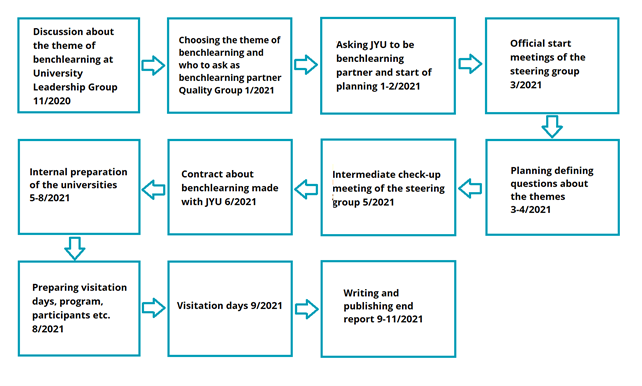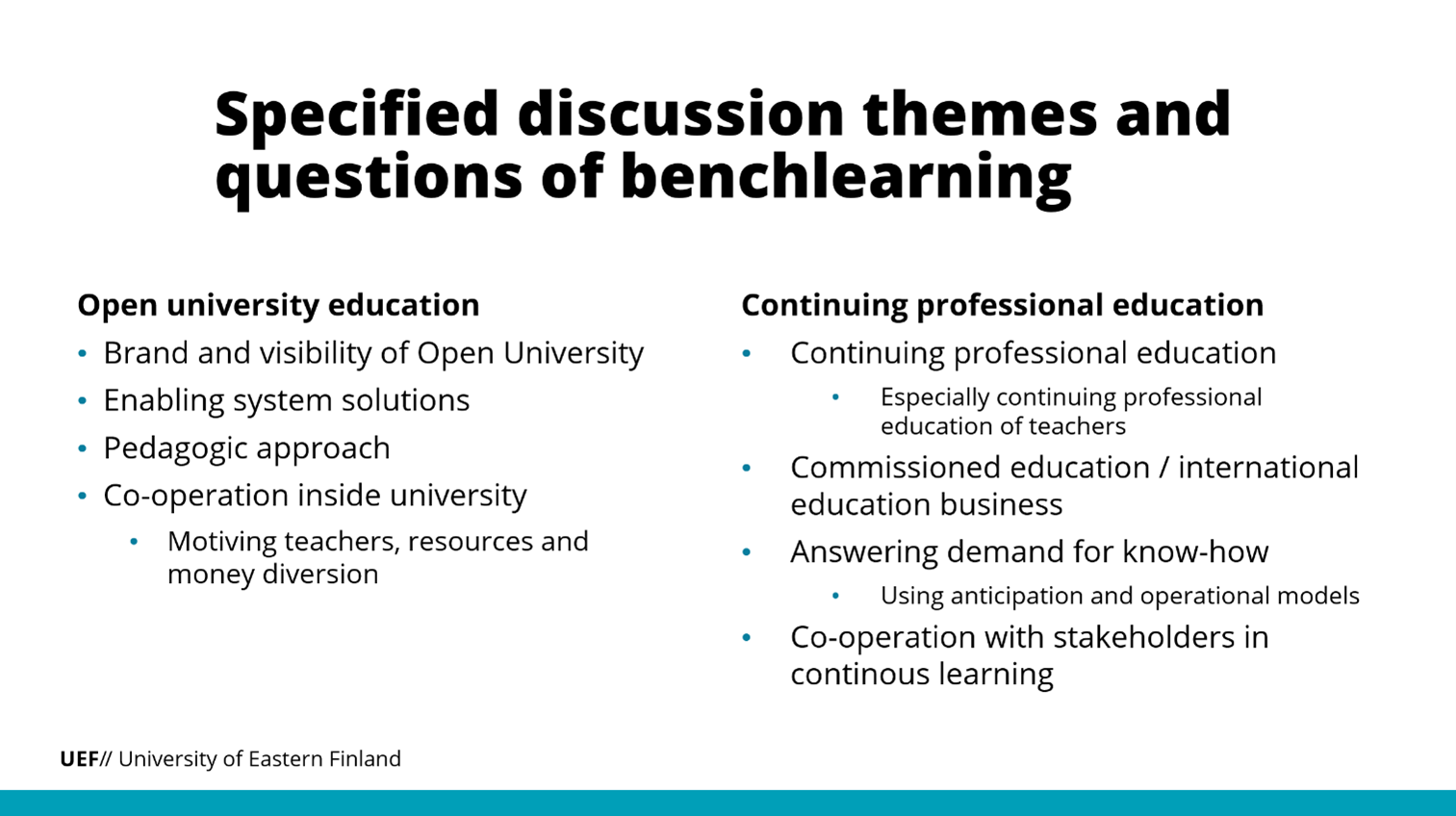Benchlearning objectives and process
The University of Eastern Finland (UEF) and the University of Jyväskylä (JYU) benchlearning project related to Assessment Area I was launched following a discussion in the UEF Leadership Group. The discussion identified the theme of continuous learning as important for the university. JYU was seen as an interesting benchmark and an advanced player in the field of continuous learning. JYU agreed to partner and learning themes were identified for the respective benchlearning partners under the theme of continuous learning. The process is described in more detail in in Figure 12.

Figure 12 Benchlearning process with University of Jyväskylä
The chosen theme was continuous learning, which was divided into two areas: open university teaching (UEF’s learning area) and continuing education (JYU’s learning area), and stakeholder collaboration in both areas. The specific sub-themes are described in Figure 13.

Figure 13 Themes and questions of benchlearning
Benchlearning visit days were organised on 3 September 2021 in Jyväskylä and 7 September 2021 in Kuopio. The programmes for the visits is attached. The visits were carried out as a hybrid event, with some participants meeting on-site and other participants participating via Teams. The day in Jyväskylä covered topics related to open university education and the day in Kuopio covered issues related to continuing education. After the visits, each organisation reflected in its own way on what the benchlearning visits had provided and compiled a summary of the findings. Based on the findings, a joint report was compiled.
The whole benchlearning process was perceived as excellent. The joint preparation was smooth. The chosen topic was important to both organisations and, through it, the learning topics that were important to both were identified. During the process, several good practices and areas for improvement were identified in relation to the theme of continuous learning. The discussions were open and reflective in a good spirit. The joint benchlearning discussion highlighted that, although organised in different ways, both universities are also grappling with very similar issues and challenges. Overall, the process has been very educational.
Benchlearning outcomes
UEF’s strength was the efficient use of resources, as teaching is integrated and teachers teach both open university students and degree students at the same time. The funding model supports integrated open university teaching by the units. Processes have been streamlined and, for example, certificates have been harmonised between institutions and the Centre for Continuous Learning. Continuous learning is strongly reflected in the university’s strategy. Continuous learning was seen as a well-produced entity and a logical description of the service delivery process for continuous learning has been made. A people-driven approach to relationship building has been adopted, with activities opening up through designated account and relationship managers.
Development needs that have emerged during the process include making the pathway for open university students starting their studies more student-centred. Involving different actors in branding and blogging is something that can be learned from a benchlearning partner.
JYU’s strengths were the student-centred nature of its open university activities and the international perspective, which was well taken into account in its development. In marketing, branding work is focused on key target groups and products, but smaller target groups and products are also highlighted where appropriate. Branding is part of what everyone does at every stage of the marketing process. The mapping of customer needs is systematic.
The benchlearning partner saw the improvement of access to the CRM-9 system in their own operations as a development target, and, through it, the possibilities of using after-sales marketing. It was also felt that deepening the customership thinking and combining B2B marketing with RDI activities could bring a new perspective to stakeholder cooperation. UEF’s pilot experiences with hybrid open university and continuing education products were good learning points.
Evaluation of benchlearning
Both universities considered the benchlearning process to be successful and useful. As a process, benchlearning has been very interactive. It has opened up new channels of discussion and helped to find new contacts for cooperation.
The advantages of using benchlearning were seen in the exchange of ideas, easy comparison of approaches, and learning together from each other. For example, during the process it became clear that there is no one right way to do things; instead, there are many different ways to do the same thing.
| Good practices of your organisation | Good practices of the partner organisation | ||||||||||
|
|
| Concrete actions to be applied on the basis of the benchlearning process
|
| Centre for Continuous Learning has named contact person for communications in Communications and Media Relations.
Teachers from departments have been included in marketing and they have been encouraged to write and produce blogs etc. to promote opportunities of the open university. Budget of Centre for Continuous Learning includes resources to do paid advertisement with that content. |
Audit team’s feedback
UEF selected the theme of continuous learning including stakeholder cooperation after a discussion at the University leadership group in November 2020. The quality group choose the theme and the partner to invite in early 2021. The audit team considers the theme to be well aligned with the mission and profile of the university since UEF is one of the largest providers of open university education in Finland. In the UEF Strategy 2030 continuous learning is highlighted with education that anticipates societal needs. The benchlearning partner, the University of Jyväskylä (JYU), has as a strategic goal in their educational development program: “The operating model for continuous learning renews the world of work and the competence of those who operate”. The audit team agrees that JYU was a good choice as partner in the benchlearning project with the theme continuous learning. During the audit visit, it became clear that continuous learning is an area of great importance to the university.
The process for the project is displayed in the SAR and shows an integrated process with both partners involved in planning and performing the exercises together and ending up with a published report. Several good practices at both universities were identified and concrete actions have already been taken. The process was excellent and the joint preparation smooth according to the SAR, with the overall judgement being “very educational”. The value of a benchlearning exercise with exchange of ideas and learning together is praised. The project has been successfully carried out despite the pandemic. This is a good example of mutual learning and great collaborative work.